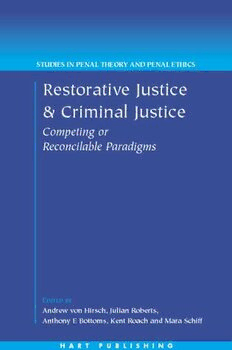
Restorative Justice and Criminal Justice (Studies in Penal Theory and Penal Ethics) PDF
360 Pages·2003·1.567 MB·English
Most books are stored in the elastic cloud where traffic is expensive. For this reason, we have a limit on daily download.
Preview Restorative Justice and Criminal Justice (Studies in Penal Theory and Penal Ethics)
Description:
Restorative Justice has emerged around the world as a potent challenge to traditional models of criminal justice, and restorative programs, policies and legislative reforms are being implemented in many western nations. However, the underlying aims, values and limits of this new paradigm remain somewhat uncertain and those advocating Restorative Justice have rarely engaged in systematic debate with those defending more traditional conceptions of criminal justice. This volume, containing contributions from scholars of international renown, provides an analytic exploration of Restorative Justice and its potential advantages and disadvantages. Chapters of the book examine the aims and limiting principles that should govern Restorative Justice, its appropriate scope of application, its social and legal contexts, its practice and impact in a number of jurisdictions and its relation to more traditional criminal justice conceptions. These topics are addressed by twenty distinguished criminologists and legal scholars in papers which make up this volume. These contributions will help clarify the aims that Restorative Justice might reasonably hope to achieve, the limits that should apply in pursuing these aims, and how restorative strategies might fare with, or replace, other penal strategies.
See more
The list of books you might like
Most books are stored in the elastic cloud where traffic is expensive. For this reason, we have a limit on daily download.
